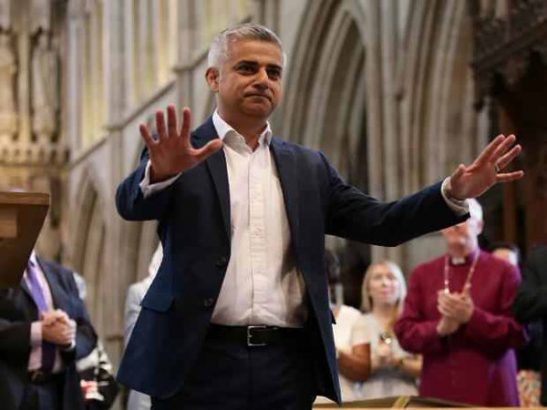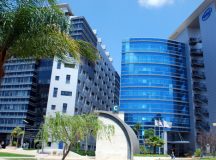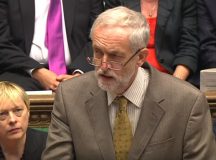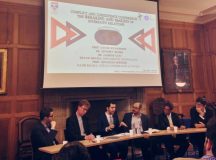‘Yes, but is it good for the Jews?’ goes the classic question, often used ironically, to ask what the effect of a given event will be on the Jewish community.As the first Muslim to be elected mayor of a major Western city, Sadiq Khan is acutely aware of both the hopes and the fears his election raises. But even the most cursory examination of the new mayor of London reveals a clear answer: yes.
‘I’ll be the Muslim mayor that stands up for Jewish rights.’ (Sadiq Khan)
Sadiq’s biography is one of striking success: from civil rights lawyer to left-wing champion to mayoral candidate and now Mayor. The ‘son of a bus driver’ (who’ll fix the tube and the buses) from a working class estate (‘who’ll fix the housing crisis’) won the mayoralty with a near textbook application of personal story to political narrative.
But when the time came to run for Mayor, Sadiq was acutely aware that there was a risk that the Jewish community, who are increasingly wary of the national Labour Party, would be particularly nervous about the idea of Muslim Mayoral candidate.
Yet long before his mayoral run, he spent years working to strengthen relationships between the Jewish and Muslim communities. As Communities Minister in the last Labour government his work with Lord Parry Mitchell and the Coexistence Trust had won praise, as had his membership of the All Party Parliamentary Group on antisemitism. These national stances were mirrored in his own local efforts in his native parliamentary constituency of Tooting where he forged a strong relationship with Nightingale House – a large Jewish Care Home.
In many ways London was the perfect city for Sadiq’s political vision. As a global city rivalled only perhaps by New York in terms of financial importance (and as a multicultural hub so proud of its diversity that it was the centerpiece of its 2012 Olympic Games bid) London represented the kind of dynamic economy and tolerant 21st century society that was at the heart of his politics. The symbolism alone of a Muslim mayor leading this remarkable melting pot of tech vibrancy, financial power and ethnic richness would send a powerful message the world over. But that message would only be heard if the hard work of community outreach and engagement preceded the mayoralty.
At the very outset of his quest to become Mayor in May 2015, Sadiq laid out in uncompromising terms his unwavering support for the Jewish community. Sadiq made himself as available as possible to the Jewish News and Jewish Chronicle – in effect treating them like national newspapers. He gave them each at least five interviews over the course of the year, even and especially when he knew the questions on the Labour Party, Israel and the Jewish community would be tough.
Sadiq summed up his approach in three pledges to the Jewish community:
- I’ll make combating antisemitism and providing the Jewish community with the resources it needs to be safe a top policing priority. I will call out antisemitism wherever it arises. Nothing excuses this ignorant and shameful hatred. As a Muslim I’ve been subjected to Islamophobic abuse so I stand in solidarity with the Jewish community when they similarly suffer.
- I’ll remain resolutely focused on the crucial job of bringing improved services and strong city leadership to London. I won’t be distracted into using the Mayoralty to offer commentary on foreign policy issues. I’ll speak out when I have strong views but always be particularly conscious of the need to be a voice for peace and coexistence around the world.
- I will work with all Jewish organisations and charities to bring our communities together and promote understanding. Like 3FF, a mentoring scheme which I have supported in Parliament, and the brilliant Mitzvah Day initiative. Laura Marks and Daniela Pears have bought people from all backgrounds together to celebrate a Jewish day of social action – showcasing London at its best.
Nor did he succumb to simply narrow-casting his message to Jewish voters through Jewish media: he made stronger Jewish community relations a cornerstone of his messaging in the national newspaper The Guardian and the major London paper The Evening Standard too, as well as in his campaign’s digital messaging through YouTube videos.
And stronger relations with Jewish voters wasn’t just a matter of media management either. Thanks to the long term relationship Sadiq had built with the Jewish Labor Movement, the group ran volunteer phone banks to support him.
Sadiq stressed that as someone from a community experiencing high levels of discrimination, he genuinely understood the day-to day-experiences of London’s Jewish community and the global significance of a Muslim Mayor who would do more to stand up for London’s Jewish community than any previous Mayor.
As Sadiq himself said when asked how he would reach out to Jewish voters: ‘By engaging, by listening, by talking, by reasoning. Look I’m going to spend the next nine months persuading every Londoner to vote for me. The obvious choice open to someone like me is to ignore the Jewish Chronicle, but that’s not how I do stuff. I’ll be on your side when it comes to the challenges the Jewish community will face.’
Underpinning this was his pledge to ‘make tackling antisemitism a top priority for the Metropolitan Police’ and to make the capital a ‘beacon’ of tolerance.
These words were backed up by a programme of regular community visits. During Ramadan 2015 he held five Iftar events in Synagogues. Over the course of the year he went on two patrols with the Community Security Trust and met the Chief Rabbi twice – as well as numerous campaign days in Finchley, Hackney and other areas with large Jewish communities.
Sadiq understood that foreign policy was likely to be a major concern for London’s Jewish Community and from the outset of his campaign pledged not to use City Hall as a pulpit for foreign affairs. He went on to outline his opposition to boycott, sanction or divestment campaigns against Israel – an important clarification given earlier questions about his position on the boycott issue.
Politically, this clearly came at a cost to his support in some sections of the Muslim community, but Sadiq believed strongly that it was his duty to do everything possible to reassure Jewish Londoners about the kind of mayor he would be.
As Labour began its descent into antisemitism arguments in 2015 Sadiq took a strong and early stand against extremism. In well received speeches to both Westminster journalists and the Union of Jewish Students he underscored his commitment to strong community relations.
Sadiq quickly called out the antisemitism issue within the Labour Party every time it reared its ugly head. In his very first interview with the major tabloid newspaper The Mail on Sunday just a week after winning his primary he called for Labour Leader Jeremy Corbyn to take swift action against the growing threat of antisemitism. And when the former London mayor Ken Livingstone claimed that Hitler had been a Zionist, Sadiq was one of the first Labour politicians to call for Livingstone to be removed from the party.
Sadiq has said he feels ‘embarrassed and sorrowful’ over the antisemitism crisis facing Labour. He thinks Labour ‘need to walk the walk not simply talk the talk. There should be no hierarchy when it comes to racism. Racism is racism. And if it means members of my party – senior members including members of the NEC (the party’s governing committee) – being trained on what antisemitism is then so be it.’
To those who know him well it is clear that such stances aren’t just politics for him, they come from the heart. For as someone who has himself confronted racial discrimination he feels strongly about antisemitism.
His early days as Mayor have shown that he intends to keep his promises to Jewish Londoners. The very first event he attended as Mayor was Yom HaShoah on the Sunday after the election, where he sat between the Israeli ambassador and Chief Rabbi. He told the 3,000 strong audience that under his watch, London would show ‘zero tolerance towards antisemitism’ and that ‘I want to be Mayor for all Londoners and there are Londoners who are Holocaust survivors. They want a Mayor who understands the horrors of the Holocaust. And it’s important for me as the Mayor to reflect on that, and to be educated on it as well.’
Soon after, Sadiq signed the Mayors United Against Antisemitism pledge saying he was ‘proud’ to join the campaign and would ‘encourage other mayors across the country and Europe to do the same’.
Sadiq comes to the mayoralty determined to prove that his years of work for stronger community relations as an MP and lawyer can now be put into practice on a London-wide scale. His ambition is clear and simple: to be a Muslim mayor trusted and respected by all the communities he serves. His life in public service stands as strong testament to his chance of success.





































The article by MARCUS ROBERTS totally omitted that Khan’s behaviour seems to be his strategy to become Labour Leader.
Khan nominated Corbyn for the Labour Party leadership and, than distanced himself, once Livingstone had made his anti-zionist remarks. These remarks ,solidified the one & a half million London Muslim vote. Roberts article was very creepy …a typical Liberal left leaning apologist for Judaism.’Good men say nothing’.
Roberts completely omitted Khan’s involvement with Hamas. As well as being the lawyer representng Hamas, which is of course Hamas’s human ,right he shared a platform with this terrorist organisation.
Yours sincerely
Terry